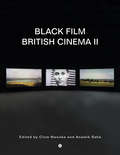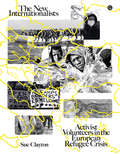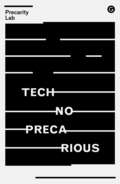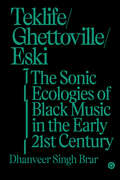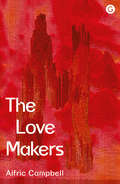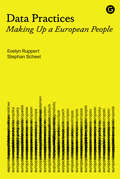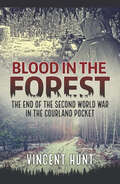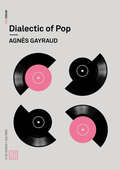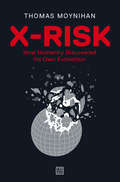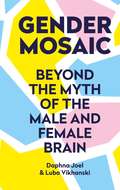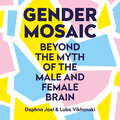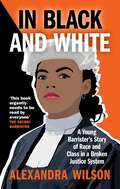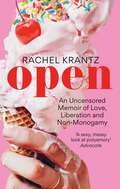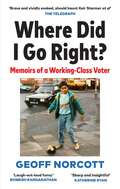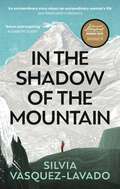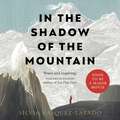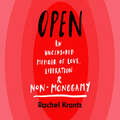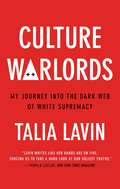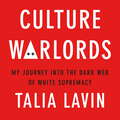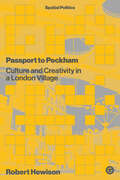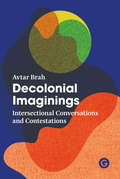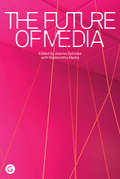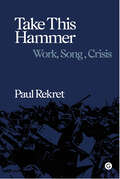- Table View
- List View
Black Film British Cinema II
by Clive Nwonka and Anamik SahaThe politics of race in British screen culture over the last 30 years vis-a-vis the institutional, textual, cultural and political shifts that have occurred during this period.Black Film British Cinema II considers the politics of blackness in contemporary British cinema and visual practice. This second iteration of Black Film British Cinema, marking over 30 years since the ground-breaking ICA Documents 7 publication in 1988, continues this investigation by offering a crucial contemporary consideration of the textual, institutional, cultural and political shifts that have occurred from this period. It focuses on the practices, values and networks of collaborations that have shaped the development of black film culture and representation. But what is black British film? How do such films, however defined, produce meaning through visual culture, and what are the political, social and aesthetic motivations and effects? How are the new forms of black British film facilitating new modes of representation, authorship and exhibition? Explored in the context of film aesthetics, curatorship, exhibition and arts practice, and the politics of diversity policy, Black Film British Cinema II provides the platform for new scholars, thinkers and practitioners to coalesce on these central questions. It is explicitly interdisciplinary, operating at the intersections of film studies, media and communications, sociology, politics and cultural studies. Through a diverse range of perspectives and theoretical interventions that offer a combination of traditional chapters, long-form essays, shorter think pieces, and critical dialogues, Black Film British Cinema II is a comprehensive, sustained, wide ranging collection that offers new framework for understanding contemporary black film practices and the cultural and creative dimensions that shape the making of blackness and race.ContributorsBidisha, Ashley Clark, Shelley Cobb, James Harvey, Melanie Hoyes, Maryam Jameela, Kara Keeling, Oslem Koskal, Rabz Lansiquot, Sarita Malik, Richard Martin, So Mayer, Alessandra Raengo, Richard T. Rodríguez, Tess S. Skadegård Thorsen, Natalie Wreyford
The New Internationalists: Activist Volunteers in the European Refugee Crisis
by Sue ClaytonAn account of the mobilization of thousands of volunteers who rescued, supported, and welcomed refugees during the recent European refugee crisis.In The New Internationalists, Sue Clayton tells the story of the largest civic mobilization since the Second World War, when volunteers--many young and untrained--took on unimaginable responsibilities and saved thousands of lives. During the European refugee crisis of 2015-2020, they witnessed first hand the catastrophic failure of established NGOs, and the indifference--and frequently, the open hostility--of the EU and national governments. Many faced state hostility themselves. Their accounts show how activist volunteers have shaped today's European humanitarian agenda, and provide a powerful critique of failures of current policy.
Technoprecarious
by Precarity LabAn analysis that traces the role of digital technology in multiplying precarity.Technoprecarious advances a new analytic for tracing how precarity unfolds across disparate geographical sites and cultural practices in the digital age. Digital technologies--whether apps like Uber built on flexible labor or platforms like Airbnb that shift accountability to users--have assisted in consolidating the wealth and influence of a small number of players. These platforms have also furthered increasingly insecure conditions of work and life for racial, ethnic, and sexual minorities, women, indigenous people, migrants, and peoples in the global south. At the same time, precarity has become increasingly generalized, expanding to include even the creative class and digital producers themselves.
Teklife, Ghettoville, Eski: The Sonic Ecologies of Black Music in the Early 21st Century (Goldsmiths Press / Sonics Series)
by Dhanveer Singh BrarHow black electronic dance music makes it possible to reorganize life within the contemporary city.Teklife, Ghettoville, Eski argues that Black electronic dance music produces sonic ecologies of Blackness that expose and reorder the contemporary racialization of the urban--ecologies that can never simply be reduced to their geographical and racial context. Dhanveer Singh Brar makes the case for Black electronic dance music as the cutting-edge aesthetic project of the diaspora, which due to the music's class character makes it possible to reorganize life within the contemporary city.Closely analysing the Footwork scene in South and West Chicago, the Grime scene in East London, and the output of the South London producer Actress, Brar pays attention to the way each of these critically acclaimed musical projects experiment with aesthetic form through an experimentation of the social. Through explicitly theoretical means, Teklife, Ghettoville, Eski foregrounds the sonic specificity of 12" records, EPs, albums, radio broadcasts, and recorded performances to make the case that Footwork, Grime, and Actress dissolve racialized spatial constraints that are thought to surround Black social life.Pushing the critical debates concerning the phonic materiality of blackness, undercommons, and aesthetic sociality in new directions, Teklife, Ghettoville, Eski rethinks these concepts through concrete examples of contemporary black electronic dance music production that allows for a theorization of the way Footwork, Grime, and Actress have--through their experiments in blackness--generated genuine alternatives to the functioning of the city under financialized racial capitalism.
The Love Makers
How artificial intelligence and robotics are transforming the future of love and desire: a philosophical thriller and essays.A chance encounter between two women and a road trip into the future: It's Christmas Eve, and Scarlett, banker-turned-technologist, is leaving a secret underground lab to catch the last flight that will get her home in time to open presents with her three-year-old son. She offers a lift to a young woman in distress, who shares her intimate life story as they drive to the airport. These revelations will have devastating consequences for both of them. The Love Makers is a philosophical thriller about female friendship, class, motherhood, women, and work--and how artificial intelligence and robotics are transforming the future of love and desire. Aifric Campbell combines her novel with essays from leading scientists and commentators who examine what's at stake in our human-machine relationships. What is our future as friends, parents, lovers? Will advances in intelligent machines reverse decades of progress for women? From robot nannies to generative art and our ancient dreams of intelligent machines, The Love Makers blends storytelling with science communication to investigate the challenges and opportunities of emergent technologies and how we want to live. ContributorsRonny Bogani, Joanna J. Bryson, Julie Carpenter, Stephen Cave, Anita Chandran, Peter R. N. Childs, Kate Devlin, Kanta Dihal, Mary Flanagan, Margaret Rhee, Amanda Sharkey, Roberto Trotta, E. R. Truitt, and Richard Watson
Data Practices: Making Up a European People
by Evelyn RuppertHow EU data practices establish and assign people to categories, and how this matters in enacting--"making up"--Europe as a population and people.What is "Europe" and who are "Europeans"? Data Practices approaches this contemporary political and theoretical question by treating it as a practical problem of counting. Only through the myriad data practices that make up methods such as censuses can EU member states know their national populations, and this in turn is utilized by the EU to understand the population of Europe. But this volume approaches data practices not simply as reflecting populations but as performative in two senses: they simultaneously enact--that is, "make up"--a European population and, by so doing--intentionally or otherwise--also contribute to making up a European people.The book develops a conception of data practices to analyze and interpret findings from collaborative ethnographic multisite fieldwork conducted by an interdisciplinary team of social science researchers as part of a five-year project, Peopling Europe: How Data Make a People. The book focuses on data practices that involve establishing and assigning people to categories and how this matters in enacting Europe as a population and people. Five core chapters explore key categories of people--usual residents, refugees, homeless people, migrants, and ethnic minorities--and how they come into being through specific data practices such as defining, estimating, recalibrating and inferring. Two additional chapters address two key subject positions that data practices produce and require: the data subject and the statistician subject.
Blood in the Forest: The End of the Second World War in the Courland Pocket
by Vincent HuntWith original research and interviews with survivors, a journalist reveals the brutal yet forgotten battles in Latvia during the final months of WWII. While the eyes of the world were on Hitler&’s bunker, more than half a million men fought six cataclysmic battles in the fields and forests of Western Latvia known as the Courland Pocket. Just an hour from the capital Riga, German forces bolstered by Latvian Legionnaires were trapped with their backs to the Baltic. Forced into uniform by Nazi and Soviet occupiers, Latvian fought Latvian – sometimes brother against brother. Hundreds of thousands of men died for little territorial gain in unimaginable slaughter. When the Germans capitulated, thousands of Latvians continued a war against Soviet rule from the forests for years afterwards. An award-winning documentary journalist, Vincent Hunt travels through the modern landscape gathering eye-witness accounts, piecing together the stories of those who survived. He meets veterans who fought in the Latvian Legion, former partisans and a refugee who fled the Soviet advance to later become President, Vaira Vike-Freiberga. A survivor of the little-known concentration camp at Popervale details his escape from a death march and subsequent survival in the forests with a Soviet partisan group - and a German deserter. With detailed maps and expert contributions alongside rare newspaper archives, photographs from private collections and extracts from diaries translated from Latvian, German and Russian, Hunt assembles a ghastly picture of death and desperation in a nation both gripped by war and at war with itself.
Dialectic of Pop (Urbanomic: Mono #8)
by Agnes GayraudA philosophical exploration of pop music that reveals a rich, self-reflexive art form with unsuspected depths. In the first major philosophical treatise on the subject, Agnès Gayraud explores all the paradoxes of pop—its inauthentic authenticity, its mass production of emotion and personal resonance, its repetitive novelty, its precision engineering of seduction—and calls for pop (in its broadest sense, encompassing all genres of popular recorded music) to be recognized as a modern, technologically mediated art form to rank alongside cinema and photography. In a thoroughgoing engagement with Adorno's fierce critique of "standardized light popular music," Dialectic of Pop tracks the transformations of the pop form and its audience over the course of the twentieth century, from Hillbilly to Beyoncé, from Lead Belly to Drake. Inseparable from the materiality of its technical media, indifferent and intractable to the perspectives of high culture, pop subverts notions of authenticity and inauthenticity, original and copy, aura and commodity, medium and message. Gayraud demonstrates that, far from being the artless and trivial mass-produced pabulum denigrated by Adorno, pop is a rich, self-reflexive artform that recognises its own contradictions, incorporates its own productive negativity, and often flourishes by thinking "against itself."Dialectic of Pop sings the praises of pop as a constitutively impure form resulting from the encounter between industrial production and the human predilection for song, and diagnoses the prospects for twenty-first century pop as it continues to adapt to ever-changing technological mediations.
X-Risk: How Humanity Discovered Its Own Extinction
by Thomas MoynihanHow humanity came to contemplate its possible extinction.From forecasts of disastrous climate change to prophecies of evil AI superintelligences and the impending perils of genome editing, our species is increasingly concerned with the prospects of its own extinction. With humanity's future on this planet seeming more insecure by the day, in the twenty-first century, existential risk has become the object of a growing field of serious scientific inquiry. But, as Thomas Moynihan shows in X-Risk, this preoccupation is not exclusive to the post-atomic age of global warming and synthetic biology. Our growing concern with human extinction itself has a history. Tracing this untold story, Moynihan revisits the pioneers who first contemplated the possibility of human extinction and stages the historical drama of this momentous discovery. He shows how, far from being a secular reprise of religious prophecies of apocalypse, existential risk is a thoroughly modern idea, made possible by the burgeoning sciences and philosophical tumult of the Enlightenment era. In recollecting how we first came to care for our extinction, Moynihan reveals how today's attempts to measure and mitigate existential threats are the continuation of a project initiated over two centuries ago, which concerns the very vocation of the human as a rational, responsible, and future-oriented being.
Gender Mosaic: Beyond the myth of the male and female brain
by Luba Vikhanski Prof. Daphna JoelThis timely manifesto calls for a future free from gender-based assumptions about human potential. Written by the internationally renowned neuroscientist whose game-changing research debunks the myth of male and female brains.For generations we've been taught that women and men differ in profound ways. Women are supposedly more sensitive and cooperative, whereas men are more aggressive and sexual because this or that region in the brains of women is larger or smaller than in the brains of men, or because they have more or less of this or that hormone. This story seems to provide us with a neat biological explanation for much of what we encounter in day-to-day life. It's even sometimes used to explain why, for example, most teachers are women and most engineers are men. But is it true? Using the ground-breaking results from her own lab and from other recent studies, neuroscientist Daphna Joel shows that it is not. Instead, argues Joel, every brain - and every human being - is a mosaic, or mixture, of 'female' and 'male' characteristics. With urgent practical implications for the world around us, this is a fascinating look at gender - how it works, its history and its future - and a sorely needed investigation into the false basis of our most fundamental beliefs. Perfect for readers of Mary Beard's Women & Power, Cordelia Fine's Testosterone Rex, Chimamanda Ngozi Adichie's We Should All Be Feminists and Gina Rippon's The Gendered Brain. 'Brilliantly accessible. Gender Mosaic takes you on a fascinating scientific journey that will transform how you think about sex, gender and the brain.' Cordelia Fine, author of Testosterone Rex'A power-packed manifesto that envisions what our world might look like if we let go of tired gender stereotypes.' - Sarah Richardson, author of Sex Itself 'Gender Mosaic is the book I've been waiting for! Enlightening, funny and never dogmatic, Joel plumbs the science, offering great insights into how moving beyond that stale story of the male and female brain could improve medicine, education, careers and relationships.' - Rebecca Jordan-Young, author of Brain Storm'Joel and Vikhanski offer a fascinating glimpse of what's possible when we liberate ourselves from the myth of pink and blue brains.' - Lise Eliot PhD, Professor of Neuroscience, Rosalind Franklin University of Medicine and Science'This is a fantastic book. It is one of the best books about sex, gender, biology, and the brain - and the social implications of these issues - that I have ever read. The writing is clear, captivating, and concise - and the content is groundbreaking. This is a visionary and brave book.' - Rebecca S. Bigler, Professor Emeritx of Psychology, University of Texas at Austin
Gender Mosaic: Beyond the myth of the male and female brain
by Luba Vikhanski Prof. Daphna JoelInfluential neuroscientist Professor Daphna Joel explains why there is no such thing as a male or female brain and no neural basis for differentiating people based on sex.This timely manifesto calls for a future free from gender-based assumptions about human potential. Written by the internationally renowned neuroscientist whose game-changing research debunks the myth of male and female brainsFor generations we've been taught that women and men differ in profound ways. Women are supposedly more sensitive and cooperative, whereas men are more aggressive and sexual, because this or that region in the brains of women is larger or smaller than in the brains of men, or because they have more or less of this or that hormone. This story seems to provide us with a neat biological explanation for much of what we encounter in day-to-day life. It's even sometimes used to explain, for example, why most teachers are women and most engineers are men. But is it true? Using the ground-breaking results from her own lab and from other recent studies, neuroscientist Daphna Joel shows that it is not. Instead, argues Joel, every brain - and every human being - is a mosaic, or mixture, of 'male' and 'female' characteristics. With urgent practical implications for the world around us, this is a fascinating look at gender - how it works, its history and its future - and a sorely needed investigation into the false basis of our most fundamental beliefs. Perfect for readers of Mary Beard's Women & Power, Cordelia Fine's Testosterone Rex, Chimamanda Ngozi Adichie's We Should All Be Feminists and Gina Rippon's The Gendered Brain. 'Brilliantly accessible. Gender Mosaic takes you on a fascinating scientific journey that will transform how you think about sex, gender and the brain.' Cordelia Fine, author of Testosterone Rex (p) 2019 Octopus Publishing Group
In Black and White: A Young Barrister's Story of Race and Class in a Broken Justice System
by Alexandra Wilson'An absolute triumph; a compelling and courageous memoir forcing the legal profession to confront uncomfortable truths about race and class. Alexandra Wilson is a bold and vital voice. This is a book that urgently needs to be read by everyone inside, and outside, the justice system.' THE SECRET BARRISTER 'A riveting book in the best tradition of courtroom dramas but from the fresh perspective of a young female mixed-race barrister. That Alexandra is "often" mistaken for the defendant shows how important her presence at the bar really is.' MATT RUDD, THE SUNDAY TIMES MAGAZINE'This is the story of a young woman who overcame all the obstacles a very old profession could throw at her, and she survived, with her integrity intact.' BENJAMIN ZEPHANIAHAlexandra Wilson was a teenager when her dear family friend Ayo was stabbed on his way home from football. Ayo's death changed Alexandra. She felt compelled to enter the legal profession in search of answers. As a junior criminal and family law barrister, Alexandra finds herself navigating a world and a set of rules designed by a privileged few. A world in which fellow barristers sigh with relief when a racist judge retires: 'I've got a black kid today and he would have had no hope'. In her debut book, In Black and White, Alexandra re-creates the tense courtroom scenes, the heart-breaking meetings with teenage clients, and the moments of frustration and triumph that make up a young barrister's life. Alexandra shows us how it feels to defend someone who hates the colour of your skin, or someone you suspect is guilty. We see what it is like for children coerced into county line drug deals and the damage that can be caused when we criminalise teenagers. Alexandra's account of what she has witnessed as a young mixed-race barrister is in equal parts shocking, compelling, confounding and powerful. 'An inspirational, clear-eyed account of life as a junior barrister is made all the more exceptional by the determination, passion, humanity and drive of the author. Anyone interested in seeing how the law really works should read it.' SARAH LANGFORD'The personal narrative of a young female lawyer of mixed heritage who is defying the soft bigotry of low expectations by sharing her journey inspires us all to do the same in our own way, and this is a powerful message which needs to be shared.' DR TUNDE OKEWALE MBE, FOUNDER OF URBAN LAWYERS'A refreshingly honest account of the challenges faced by a young female barrister of mixed heritage' JUDY KHAN QC, JOINT HEAD OF GARDEN COURT CHAMBERS
In Black and White: A Young Barrister's Story of Race and Class in a Broken Justice System
by Alexandra Wilson**NOW WITH NEW AFTERWORD AND READING GROUP QUESTIONS**'An absolute triumph; a compelling and courageous memoir forcing the legal profession to confront uncomfortable truths about race and class. Alexandra Wilson is a bold and vital voice. This is a book that urgently needs to be read by everyone inside, and outside, the justice system.' THE SECRET BARRISTER Alexandra Wilson was a teenager when her dear family friend Ayo was stabbed on his way home from football. Ayo's death changed Alexandra. She felt compelled to enter the legal profession in search of answers. As a junior criminal and family law barrister, Alexandra finds herself navigating a world and a set of rules designed by a privileged few. A world in which fellow barristers sigh with relief when a racist judge retires: 'I've got a black kid today and he would have had no hope'. In her debut book, In Black and White, Alexandra re-creates the tense courtroom scenes, the heart-breaking meetings with teenage clients, and the moments of frustration and triumph that make up a young barrister's life. Alexandra shows us how it feels to defend someone who hates the colour of your skin, or someone you suspect is guilty. We see what it is like for children coerced into county line drug deals and the damage that can be caused when we criminalise teenagers. Alexandra's account of what she has witnessed as a young mixed-race barrister is in equal parts shocking, compelling, confounding and powerful. 'An inspirational, clear-eyed account of life as a junior barrister is made all the more exceptional by the determination, passion, humanity and drive of the author. Anyone interested in seeing how the law really works should read it.' SARAH LANGFORD'This is the story of a young woman who overcame all the obstacles a very old profession could throw at her, and she survived, with her integrity intact.' BENJAMIN ZEPHANIAH(P)Octopus Publishing Group 2020
OPEN: An Uncensored Memoir of Love, Liberation and Non-Monogamy
by Rachel Krantz*****'A starkly naked story of a young woman's adventure of self-discovery, told with a striking lack of shame or apology. Highly recommended.' - Dr. Christopher Ryan, author of Sex At Dawn'Smart, original, ambitious, and deeply absorbing memoir... She succeeds by bringing us deftly and irresistibly into her most intimate pains and joys, stretching our understanding of what commitment and autonomy mean.' - Dr. Wednesday Martin, author of Untrue & Primates of Park Avenue'A perfect guide to our new world, the only problem I had picking up this book was putting it back down. Open compels, entertains, and may ultimately transform its readers.' - Dr. Terry Real, internationally recognised Family Therapist, author, and founder of the Relational Life Institute When Rachel Krantz met and fell for Adam, he told her that he was looking for a committed partnership - just one that did not include exclusivity.Excited but a little trepidatious, Rachel set out to see whether love and a serious relationship can coexist beyond the familiar borders of monogamy. This is her open and honest true story.Now, in her debut memoir, she chronicles her dive into non-monogamy. With fly-on-the-wall detail and extraordinary perceptiveness, OPEN takes us inside Brooklyn parties and into the wider swinger and polyamory community. Armed with her journalistic instincts, detailed journal entries and interviews with experts and therapists, Krantz also breaks new ground in confronting the unique ways tacit abuse and gaslighting can manifest when things get so complex.Unflinching and brazen, OPEN asks what liberation really looks like, and whether the pleasure really is worth the pain.
Where Did I Go Right?: How the Left Lost Me
by Geoff Norcott***'Few people walk the line of thought provoking and laugh out loud funny like Geoff Norcott.' - Romesh Ranganathan'Where Did I Go Right? is sharp, considered, insightful, and helped me make sense of "the other side". And because Geoff Norcott is so funny, it unfortunately means I can't dismiss his views entirely. It's so important to have a friend you can disagree with but still admire and Geoff can be that friend to you!' - Katherine Ryan"I've always thought the benefit of having batsh*t parents is it increases the chance of you growing up funny. It's certainly worked for Geoff Norcott." - David Baddiel"Brave... and vividly evoked. [...] 'How the left lost me' is a phrase that should haunt Kier Starmer et al. Looking at the collapse of the 'red wall', at the last election, there do seem to be a lot of disgruntled Geoffs out there." - The Telegraph"While I stand firmly at the other end of the political spectrum, it provided fascinating and well-considered insights into how the half think and, as such, should be read by both Reds and Blues." - Love Reading UK'Voting Conservative is like buying a James Blunt album: loads of people have done it, but weirdly you never meet them ...'Comedian Geoff Norcott should have been Labour through and through. He grew up on a council estate, both of his parents were disabled, and his Dad was a Union man. So, how was it that he grew up to vote Tory?In this courageously honest and provocative memoir, Geoff unpicks his working-class upbringing and his political journey from left to right. Raised by a fierce matriarch and a maverick father on a South London council estate where they filmed scenes for The Bill, Geoff spends his youth attempting to put out kitchen fires with aerosols and leaping in and out of industrial skips. But as he reaches adolescence, his political views begin to be influenced by major events including the early 90s recession, the credit crunch, and a chance encounter with Conservative PM John Major.As an adult, Geoff begins to have the gnawing feeling that the values and traditions he grew up with no longer match Labour's. And, as Brexit appears, he feels even more like a double agent operating behind enemy lines.Written with warmth, wit and often laugh-out-loud humour, Where Did I Go Right? is Geoff's attempt to understand why he ended up voting 'for the bad guys', and why blue-collared conservatism could be here to stay.Praise for Geoff Norcott:'A mature, sharp take on modern politics' - The Sunday Times'Gently abrasive, but that's what makes him so entertaining... with a sharp, self-knowing wit' -The Times'Geoff Norcott genuinely has something original to say' - New European'A refreshingly brilliant new comedic voice' - Spectator'Norcott is an out-and-out rebel' - Express
Where Did I Go Right?: How the Left Lost Me
by Geoff Norcott***'Few people walk the line of thought provoking and laugh out loud funny like Geoff Norcott.' - Romesh Ranganathan'Where Did I Go Right? is sharp, considered, insightful, and helped me make sense of "the other side". And because Geoff Norcott is so funny, it unfortunately means I can't dismiss his views entirely. It's so important to have a friend you can disagree with but still admire and Geoff can be that friend to you!' - Katherine Ryan"I've always thought the benefit of having batsh*t parents is it increases the chance of you growing up funny. It's certainly worked for Geoff Norcott." - David Baddiel"Brave... and vividly evoked. [...] 'How the left lost me' is a phrase that should haunt Kier Starmer et al. Looking at the collapse of the 'red wall', at the last election, there do seem to be a lot of disgruntled Geoffs out there." - The Telegraph"While I stand firmly at the other end of the political spectrum, it provided fascinating and well-considered insights into how the half think and, as such, should be read by both Reds and Blues." - Love Reading UK'Voting Conservative is like buying a James Blunt album: loads of people have done it, but weirdly you never meet them ...'Comedian Geoff Norcott should have been Labour through and through. He grew up on a council estate, both of his parents were disabled, and his Dad was a Union man. So, how was it that he grew up to vote Tory?In this courageously honest and provocative memoir, Geoff unpicks his working-class upbringing and his political journey from left to right. Raised by a fierce matriarch and a maverick father on a South London council estate where they filmed scenes for The Bill, Geoff spends his youth attempting to put out kitchen fires with aerosols and leaping in and out of industrial skips. But as he reaches adolescence, his political views begin to be influenced by major events including the early 90s recession, the credit crunch, and a chance encounter with Conservative PM John Major.As an adult, Geoff begins to have the gnawing feeling that the values and traditions he grew up with no longer match Labour's. And, as Brexit appears, he feels even more like a double agent operating behind enemy lines.Written with warmth, wit and often laugh-out-loud humour, Where Did I Go Right? is Geoff's attempt to understand why he ended up voting 'for the bad guys', and why blue-collared conservatism could be here to stay.Praise for Geoff Norcott:'A mature, sharp take on modern politics' - The Sunday Times'Gently abrasive, but that's what makes him so entertaining... with a sharp, self-knowing wit' -The Times'Geoff Norcott genuinely has something original to say' - New European'A refreshingly brilliant new comedic voice' - Spectator'Norcott is an out-and-out rebel' - Express
In The Shadow of the Mountain
by Silvia Vasquez-Lavado*****'Silvia Vasquez-Lavado is a warrior. I'm in awe of her strength and courage.' - Selena Gomez'powerful' - New York TimesIn the Shadow of the Mountain has all the elements a great memoir requires - a strong voice, cinematic prose, a hero to root for - in essence, an extraordinary story about an extraordinary woman's life.' - San Francisco Chronicle'Silvia Vasquez-Lavado is a woman possessed of uncommon strength, rare compassion, and a ferocious stubbornness to not allow the trauma of her childhood to destroy her life.' - Elizabeth Gilbert, author of Eat, Pray, Love YOU DON'T CONQUER A MOUNTAIN. YOU SURRENDER TO IT ONE STEP AT A TIME. Despite a high-flying career, Silvia Vasquez-Lavado knew she was hanging by a thread. Deep in the throes of alcoholism, and hiding her sexuality from her family, she was repressing the abuse she'd suffered as a child.When her mother called her home to Peru, she knew something finally had to change. It did. Silvia began to climb. Something about the sheer size of the mountains, the vast emptiness and the nearness of death, woke her up. And then, she took her biggest pain to the biggest mountain: Everest. The 'Mother of the World' allows few to reach her summit, but Silvia didn't go alone. Trekking with her to Base Camp, were five troubled young women on an odyssey that helped each confront their personal trauma, and whose strength and community propelled Silvia forward...Beautifully written and deeply moving, In the Shadow of the Mountain is a remarkable story of compassion, humility, and strength, inspiring us all to find have faith in our own heroism and resilience.
In The Shadow of the Mountain
by Silvia Vasquez-Lavado*****"Silvia Vasquez-Lavado is a woman possessed of uncommon strength, rare compassion, and a ferocious stubbornness to not allow the trauma of her childhood to destroy her life." - Elizabeth Gilbert, author of Eat, Pray, Love"Told with searing honesty, this vividly wrought memoir chronicles an almost superhuman journey from the deep vortex of trauma and self-destructive compulsions to the heights of physical endurance and spiritual emergence."- Dr. Gabor Maté, Bestselling Author of In The Realm Of Hungry Ghosts"Silvia Vasquez-Lavado is a warrior. I'm in awe of her strength and courage." - Selena Gomez YOU DON'T CONQUER A MOUNTAIN. YOU SURRENDER TO IT ONE STEP AT A TIME. Despite a high-flying career, Silvia Vasquez-Lavado knew she was hanging by a thread. Deep in the throes of alcoholism, and hiding her sexuality from her family, she was repressing the abuse she'd suffered as a child.When her mother called her home to Peru, she knew something finally had to change. It did. Silvia began to climb.Something about the sheer size of the mountains, the vast emptiness and the nearness of death, woke her up. And then, she took her biggest pain to the biggest mountain: Everest. The 'Mother of the World' allows few to reach her summit, but Silvia didn't go alone. Trekking with her to Base Camp, were five troubled young women on an odyssey that helped each confront their personal trauma, and whose strength and community propelled Silvia forward...Beautifully written and deeply moving, In the Shadow of the Mountain is a remarkable story of compassion, humility, and strength, inspiring us all to find have faith in our own heroism and resilience.(p) Octopus Publishing Group 2022
OPEN: An Uncensored Memoir of Love, Liberation and Non-Monogamy
by Rachel Krantz*****When Rachel Krantz met and fell for Adam, he told her that he was looking for a committed partnership - just one that did not include exclusivity.Excited but a little trepidatious, Rachel set out to see whether love and a serious relationship can coexist beyond the familiar borders of monogamy. This is her open and honest true story.Now, in her debut memoir, she chronicles her dive into non-monogamy. With fly-on-the-wall detail and extraordinary perceptiveness, OPEN takes us inside Brooklyn parties and into the wider swinger and polyamory community. Armed with her journalistic instincts, detailed journal entries and interviews with experts and therapists, Krantz also breaks new ground in confronting the unique ways tacit abuse and gaslighting can manifest when things get so complex.Unflinching and brazen, OPEN asks what liberation really looks like, and whether the pleasure really is worth the pain.(p) Octopus Publishing Group 2022
Culture Warlords: My Journey into the Dark Web of White Supremacy
by Talia Lavin***"One of the marvels of this furious book is how insolent and funny Lavin is; she refuses to soft-pedal the monstrous views she encounters." - The New York Times"Shocking, angry, funny and wise... Talia Lavin takes no prisoners." - Danny Wallace, bestselling author of Yes Man"Lavin writes like her hands are on fire, forcing us to take a hard look at our ugliest truths." - Pamela Collof, The New York Times Magazine & Pro Publica "Shocking, provocative and humorous, taking readers down the path of some of the vilest subcultures on the internet." - E&T MagazineTalia Lavin is every fascist's worst nightmare: a loud and unapologetic young Jewish woman, with the online investigative know-how to expose the tactics and ideologies of online hatemongers. Outspoken and uncompromising, Lavin's debut uncovers the hidden corners of the web where extremists hang out, from white nationalists and incels to national socialists and Proud Boys.In stories crammed with catfishing and gatecrashing, combined with extensive, gut-wrenching research, Lavin goes undercover as a blonde Nazi babe and a forlorn incel to infiltrate extremist communities online, including a whites-only dating site. She also discovers the network of disturbingly young extremists, including a white supremacist YouTube channel run by a 14-year-old girl with nearly one million followers. Ultimately, she turns the lens of anti-Semitism, racism, and white power back on itself in an attempt to dismantle and quash the online hate movement's schisms, recruiting tactics, and the threat it represents to politics and beyond. Shocking, provocative and humorous in equal measure, and with a take-no-prisoners attitude, Culture Warlords explores some of the vilest subcultures on the internet and how they're doing their best to infiltrate the mainstream. And then she shows us how we can fight back."Culture Warlords is a necessary and urgent read that could not have come at a much better time. Thoroughly researched and engaging, this debut demonstrates the work of a fearless reporter." - Morgan Jerkins, New York Times bestselling author of This Will Be My Undoing
Culture Warlords: My Journey into the Dark Web of White Supremacy
by Talia Lavin"Lavin writes like her hands are on fire, forcing us to take a hard look at our ugliest truths." - Pamela Collof, The New York Times Magazine & Pro Publica Talia Lavin is every fascist's worst nightmare: a loud and unapologetic young Jewish woman, with the online investigative know-how to expose the tactics and ideologies of online hatemongers. Outspoken and uncompromising, Lavin's debut uncovers the hidden corners of the web where extremists hang out, from white nationalists and incels to national socialists and Proud Boys.In stories crammed with catfishing and gatecrashing, combined with extensive, gut-wrenching research, Lavin goes undercover as a blonde Nazi babe and a forlorn incel to infiltrate extremist communities online, including a whites-only dating site. She also discovers the network of disturbingly young extremists, including a white supremacist YouTube channel run by a 14-year-old girl with nearly one million followers. Ultimately, she turns the lens of anti-Semitism, racism, and white power back on itself in an attempt to dismantle and quash the online hate movement's schisms, recruiting tactics, and the threat it represents to politics and beyond.Shocking, provocative and humorous in equal measure, and with a take-no-prisoners attitude, Culture Warlords explores some of the vilest subcultures on the internet and how they're doing their best to infiltrate the mainstream. And then she shows us how we can fight back."Culture Warlords is a necessary and urgent read that could not have come at a much better time. Thoroughly researched and engaging, this debut demonstrates the work of a fearless reporter." - Morgan Jerkins, New York Times bestselling author of This Will Be My Undoing(p) 2020 Octopus Publishing Group
Passport to Peckham: Culture and Creativity in a London Village (Spatial Politics)
by Robert HewisonAn entertaining and engaging social and cultural history of the London community of Peckham that offers lessons in urban living.&“Is there life in Peckham?&” asks a pop song of the 1980s. Peckham has been treated as a joke and a place to be avoided. It has been celebrated in television comedies, and denigrated for its levels of crime. It is a center for the arts and the creative industries, yet it also suffers from social deprivation and racial tension. Passport to Peckham is a guide to an unofficial part of London—social and cultural history written from the ground up. In this entertaining and engaging account, Hewison invites readers to explore Peckham&’s streets and presents the portrait of a community experiencing the stresses of modern living. Old and new residents rub against each other as they try to adjust to the challenges created by urban regeneration and the more subtle process of gentrification. Artists have lived and worked in Peckham for more than a century, and now Caribbean and West African communities are adding their own flavors in terms of music, drama, poetry, and film. Focused on a few square miles, Passport to Peckham raises issues of urban policy, planning, culture, and creativity that have a far wider application. As London and other major cities recover from the COVID crisis, are there lessons in urban living to be learned from the pleasures and pains of Peckham? The answer from one of Britain&’s most distinguished cultural critics is an emphatic yes.
Decolonial Imaginings: Intersectional Conversations and Contestations
by Avtar BrahA transdisciplinary study of the ways in which mobilities assume social forms and result in multiple belongings.In Decolonial Imaginings, Avtar Brah offers a transdisciplinary study of the ways in which mobilities assume social forms and result in multiple belongings. Situated within the confluence of decolonial feminist theory, border theory, and diaspora studies, the book explores borders and boundaries and how politics of connectivity are produced in and through struggles over &“difference.&” Brah examines multiple formations of power embedded in the intersections between gender, race, class, ethnicity, and sexuality. She analyzes this intersectionality in relation to diaspora; theorizes the relationship between diaspora, law, and literature; and between affect, memory, and cultural politics. Discussing the crossings of impervious borders, Brah foregrounds the economies of abandonment, particularly the plight of people in boats in the Mediterranean, a number of whom perished because of a catalogue of failures by NATO warships and European coast guards. She revisits Gilles Deleuze and Felix Guattari&’s notion of &“nomad thought&” and Braidotti&’s feminist reworking of it, and it seeks to assess this framework&’s value today. She analyzes the politics of &“Black&” in Britain with a focus on feminism constituted by women of African Caribbean and South Asian background, explores stereotypic representation of Muslim women in the context of Islamophobia and anti-Muslim racism, and considers the complexities of the #MeToo movement and how whiteness is configured in these contestations.
The Future of Media
by Goldsmiths MediaAn investigation of the future of various media industries and technologies that considers how media shape our future.How do we combat post-truth in the news? Are social media influencers the journalists of today? What is it like to live in a smart city? Does AI really change "everything"? The Future of Media investigates the future of media industries and technologies (journalism, TV, film, photography, radio, publishing, social media), while exploring how media shape our future—on a political, economic, cultural and individual level. Issues of diversity, media reform, labour, activism and art take the discussion into a wider social context. Through this, the book celebrates the importance and vitality of media in the modern world. The Future of Media is also an experiment in collaborative modes of thinking and working. Co-authored by theorists and practitioners from one of the world&’s most established media departments, it offers a radical, creative and critical take on media industries—and on world affairs.
Take This Hammer: Work, Song, Crisis (Goldsmiths Press / Sonics Series)
by Paul RekretA study of contemporary music in light of transformations to work and social life.The emergence of the popular music industry in the early twentieth century not only drove a wedge between music production and consumption, it also underscored a wider separation of labor from leisure and of the workplace from the domestic sphere. These were changes characteristic of an industrial society where pleasure was to be sought outside of work, but these categories have grown increasingly porous today. As the working day extends into the home or becomes indistinguishable from leisure time, so the role and meaning of music in everyday life changes too. In arguing that the experience of popular music is partly conditioned by its segregation from work and its restriction to the time and space of leisure—the evening, the weekend, the dancehall—Take This Hammer shows how changes to work as it grows increasingly precarious, part-time, and temporary in recent decades, are related to transformations in popular music. Connecting contemporary changes in work and the economy to tendencies in popular music, Take This Hammer shows how song-form has both reflected developments in contemporary capitalism while also intimating a horizon beyond it. From online streaming and the extension of the working day to gentrification, unemployment and the emergence of trap rap, from ecological crisis and field recording to automation and trends in dance music, by exploring the intersections of work and song in the current era, not only do we gain a new understanding of contemporary musical culture, we also see how music might gesture towards a horizon beyond the alienating experience of work in capitalism itself.
